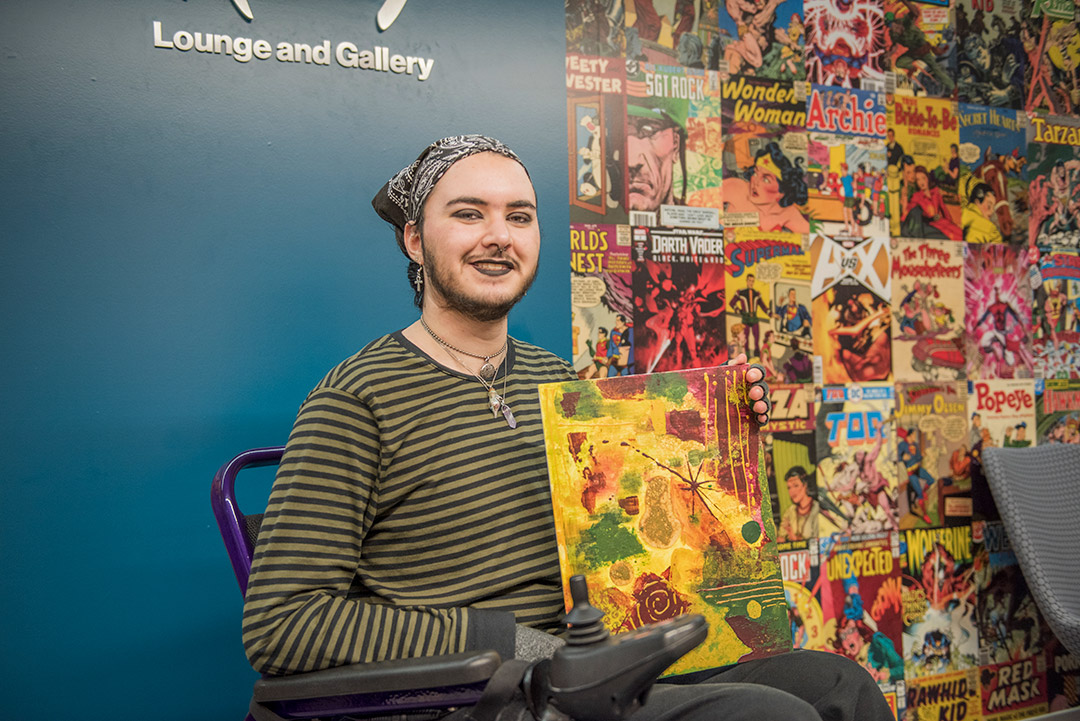Student spotlight: First-year student embraces advocacy role
Alejandro Esteban hopes to help others be more educated and empowered
Ye Htet Hlaing/RIT
Alejandro Esteban with an acrylic painting he created for a 2D design class. The assignment was to be an inspiration of one natural and one man-made object, so he chose bubble wrap and flowers as stamps, with colors inspired by watercolor paint he made out of the same flowers.
As a first-year college student, Alejandro Esteban, an illustration major from Poughkeepsie, N.Y., is enjoying his art classes and making friends. Also a member of RIT’s Disability Leadership Scholars Program, he educates others on campus about accommodations, and how students can advocate for them.
In 2021, Esteban was diagnosed with myalgic encephalomyelitis/chronic fatigue syndrome as a result of contracting Lyme Disease. He has chronic pain, fatigue, and although he is ambulatory, he uses a wheelchair to travel long distances.
“It comes with neurological issues as well,” he said. “I have brain fog. It takes me longer to process things. I can’t remember as well. I need to write things down more. It also comes with something called post exertional malaise. If I exert myself in any way, not even just physically but mentally as well, my body doesn’t react to it well.”
There are currently eight students in the Disability Leadership Scholars Program, which comes with a one-time $10,000 scholarship. The students advocate for a more accessible campus and promote disability culture through programs and outreach. The program is in its third year.
Earlier this semester, Esteban was a panelist for a discussion on disabilities for Together RIT: A Day of Dialogue.
How did you get involved with the Disability Leadership Scholars Program?
“I saw it online when I was researching colleges. I never thought I would get into RIT. It was one of my “reach” schools and I never expected to end up here, but I applied anyway. The art program, resources and co-op opportunities were a big part of my decision to come here. But the biggest part was the DLSP. Even if I didn't get in, the fact that RIT was even trying to amplify disabled voices was incredible to see.”
How has your first semester at college been?
“I’m helping a group of students start an advocacy group to help other students advocate for themselves and for their accommodations, to help people and make changes. With accessibility, there’s often a lot of parts, and when there are a lot of parts, sometimes it takes time to fix. Other than that, I’ve made a few great friends, I enjoy playing Dungeons and Dragons with them, and I’m trying to learn sign language. I’ve attended some No Voice Zone meetings. I want to learn ASL as a general skill because I don’t want to cut off anyone because I couldn’t communicate.”
Can you talk about your history of advocacy?
“I have been involved in advocacy since middle school, right after I came out as trans. I joined my school’s equity team, trying to make the middle school more equitable. I talked to a faculty team to make their spaces more accessible for transgendered students. Public speaking is actually something I quite enjoy. I have been in or around activism all my life. I’m someone who is very open. If you ask me a question, I’ll probably answer.”
You talked about having to advocate to get gym credit in high school. What did that involve?
“My high school did not have a gym class I could take. They had the "normal" or "special ed" gym class, but both involved physical activity. Since I couldn't do either, they had me do assignments that were usually given for short-term absences. I had to read an article related to the physical education section we were in and write an essay about it. I had to do one for every class I missed, which was two or three essays a week. Unfortunately, this was not a good solution. I did this up until my senior year when I told my new gym teacher that I just couldn't do it. We worked together and figured out a new assignment I could do: an anatomy drawing with a paragraph about it each week.”
Other than advocacy, what are some of your goals?
“I’d love to study abroad, in Spain. My grandfather is from there. And I’m really interested in character and fantasy art and book and novel illustration. I would love to go into a job that has that.”



